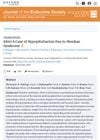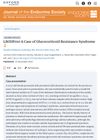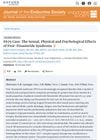 October 2024 in “Journal of the Endocrine Society”
October 2024 in “Journal of the Endocrine Society” Sheehan syndrome can cause hormone deficiencies after childbirth, but treatment can improve symptoms.
 November 2022 in “Journal of the Endocrine Society”
November 2022 in “Journal of the Endocrine Society” Immunotherapy for cancer caused a patient to develop a condition affecting hormone production, requiring ongoing hormone replacement therapy.
2 citations,
July 2022 in “Journal of the Endocrine Society” Some women with PCOS have rare genetic variants linked to the condition.
 47 citations,
September 2016 in “Reviews in endocrine and metabolic disorders”
47 citations,
September 2016 in “Reviews in endocrine and metabolic disorders” The skin's ability to produce hormones is linked to various skin conditions, and better understanding this process could lead to new treatments.
 May 2024 in “Endocrine practice”
May 2024 in “Endocrine practice” Vitamin A toxicity can cause serious health issues like hypercalcemia and is often overlooked.
 47 citations,
August 2000 in “Endocrine Reviews”
47 citations,
August 2000 in “Endocrine Reviews” The document concludes that more research is needed to understand excessive hair growth in women with normal hormone levels and regular ovulation.
 20 citations,
June 2007 in “Recent Patents on Endocrine, Metabolic & Immune Drug Discovery”
20 citations,
June 2007 in “Recent Patents on Endocrine, Metabolic & Immune Drug Discovery” Certain inhibitors can potentially treat prostate cancer and other hormone-dependent conditions by controlling sex hormone levels in cells.
 76 citations,
September 1992 in “Endocrinology”
76 citations,
September 1992 in “Endocrinology” The human type II 5α-reductase gene has a specific structure important for understanding certain medical conditions.
88 citations,
September 2003 in “Clinical endocrinology” Hormone treatment for transsexual individuals is effective but carries risks like thromboembolic events and mood changes, with most side effects being minor and reversible.
 6 citations,
May 1993 in “Archives of Disease in Childhood”
6 citations,
May 1993 in “Archives of Disease in Childhood” Children's hair loss can be caused by many factors, including autoimmune diseases, emotional stress, genetics, and infections, with treatment and prognosis varying.
 9 citations,
March 2001 in “Clinics in dermatology”
9 citations,
March 2001 in “Clinics in dermatology” Hirsutism in women is often due to hormone sensitivity and has significant psychological effects.

Accurate diagnosis and tailored treatments are crucial for managing hair loss in humans and animals.
 54 citations,
February 1993 in “Endocrine reviews”
54 citations,
February 1993 in “Endocrine reviews” Androgen conjugates might be better indicators of skin sensitivity to hormones in women with excessive hair growth.
 October 2022 in “Endocrine journal”
October 2022 in “Endocrine journal” Testosterone and dihydrotestosterone treatments can help with penile growth in males with 5α-reductase type 2 deficiency, with dihydrotestosterone being more effective in infancy.
 25 citations,
June 2019 in “Endocrine Related Cancer”
25 citations,
June 2019 in “Endocrine Related Cancer” Mutations in certain receptors can cause diseases and offer new treatment options.
 March 2023 in “Scholars international journal of obstetrics and gynecology”
March 2023 in “Scholars international journal of obstetrics and gynecology” PCOS is a complex condition that affects women's hormonal balance and metabolism, requiring lifestyle changes and medical management.
 6 citations,
October 2020 in “Endocrine journal”
6 citations,
October 2020 in “Endocrine journal” A patient with Werner syndrome showed a range of aging-like symptoms and metabolic issues, underscoring the need for early detection and treatment.
84 citations,
September 2014 in “European journal of endocrinology” Doctors should check for serious tumor causes of high androgen levels in postmenopausal women and more research is needed on this condition.
 January 2021 in “Research Square (Research Square)”
January 2021 in “Research Square (Research Square)” 150 kHz electromagnetic radiation may improve polycystic ovary condition in rats.
 3 citations,
October 2019 in “Dermatologic Therapy”
3 citations,
October 2019 in “Dermatologic Therapy” Hair loss in men is mainly caused by hormones and genes, and while current treatments can slow it down, they can't fully stop it.
 December 2024 in “Turkish Society of Clinical Biochemistry”
December 2024 in “Turkish Society of Clinical Biochemistry” Higher BPA levels may be linked to idiopathic hyperandrogenemia in women.
 November 2018 in “Endocrine Abstracts”
November 2018 in “Endocrine Abstracts” A woman's high testosterone levels were caused by a rare ovarian tumor, not the initially diagnosed condition.
 June 2013 in “Vestnik dermatologii i venerologii”
June 2013 in “Vestnik dermatologii i venerologii” Women with hair thinning have disrupted steroid hormone levels, but this doesn't often show as other health issues. More research is needed on hormone balance in this condition.
 3 citations,
March 2011 in “Informa Healthcare eBooks”
3 citations,
March 2011 in “Informa Healthcare eBooks” Acne in children varies by age and severity, requires a pediatric treatment approach, and may need diagnostic evaluation for underlying conditions.
 26 citations,
October 2016 in “Clinics in Dermatology”
26 citations,
October 2016 in “Clinics in Dermatology” Hormonal treatments can improve acne, but they come with potential side effects and risks.
 November 2022 in “Journal of the Endocrine Society”
November 2022 in “Journal of the Endocrine Society” The patient likely has Chrousos syndrome, a rare condition causing insensitivity to glucocorticoids, requiring high-dose dexamethasone treatment.
 October 2024 in “Journal of the Endocrine Society”
October 2024 in “Journal of the Endocrine Society” Post-finasteride syndrome can cause lasting sexual, physical, and mental health issues with limited treatment options.
 14 citations,
July 2021 in “Reviews in endocrine and metabolic disorders”
14 citations,
July 2021 in “Reviews in endocrine and metabolic disorders” SARS-CoV-2, the virus causing COVID-19, can affect all endocrine organs and systems, altering their function and potentially leading to disorders. Factors like diabetes and obesity increase infection risk and severity. Understanding these effects is key for effective treatment.
 24 citations,
January 2010 in “Endocrine Regulations”
24 citations,
January 2010 in “Endocrine Regulations” Taking 1mg of finasteride daily can mildly improve metabolic health and glucose regulation in men with male pattern baldness.
 11 citations,
November 2009 in “Sports Medicine”
11 citations,
November 2009 in “Sports Medicine” Irregular menstrual cycles in exercising women may be linked to energy deficiency or hormonal imbalances, requiring careful diagnosis for proper treatment.



























